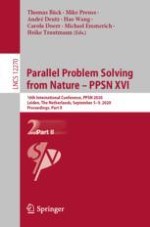2020 | OriginalPaper | Chapter
Benchmarking a \((\mu +\lambda )\) Genetic Algorithm with Configurable Crossover Probability
Authors : Furong Ye, Hao Wang, Carola Doerr, Thomas Bäck
Published in: Parallel Problem Solving from Nature – PPSN XVI
Publisher: Springer International Publishing
Activate our intelligent search to find suitable subject content or patents.
Select sections of text to find matching patents with Artificial Intelligence. powered by
Select sections of text to find additional relevant content using AI-assisted search. powered by
